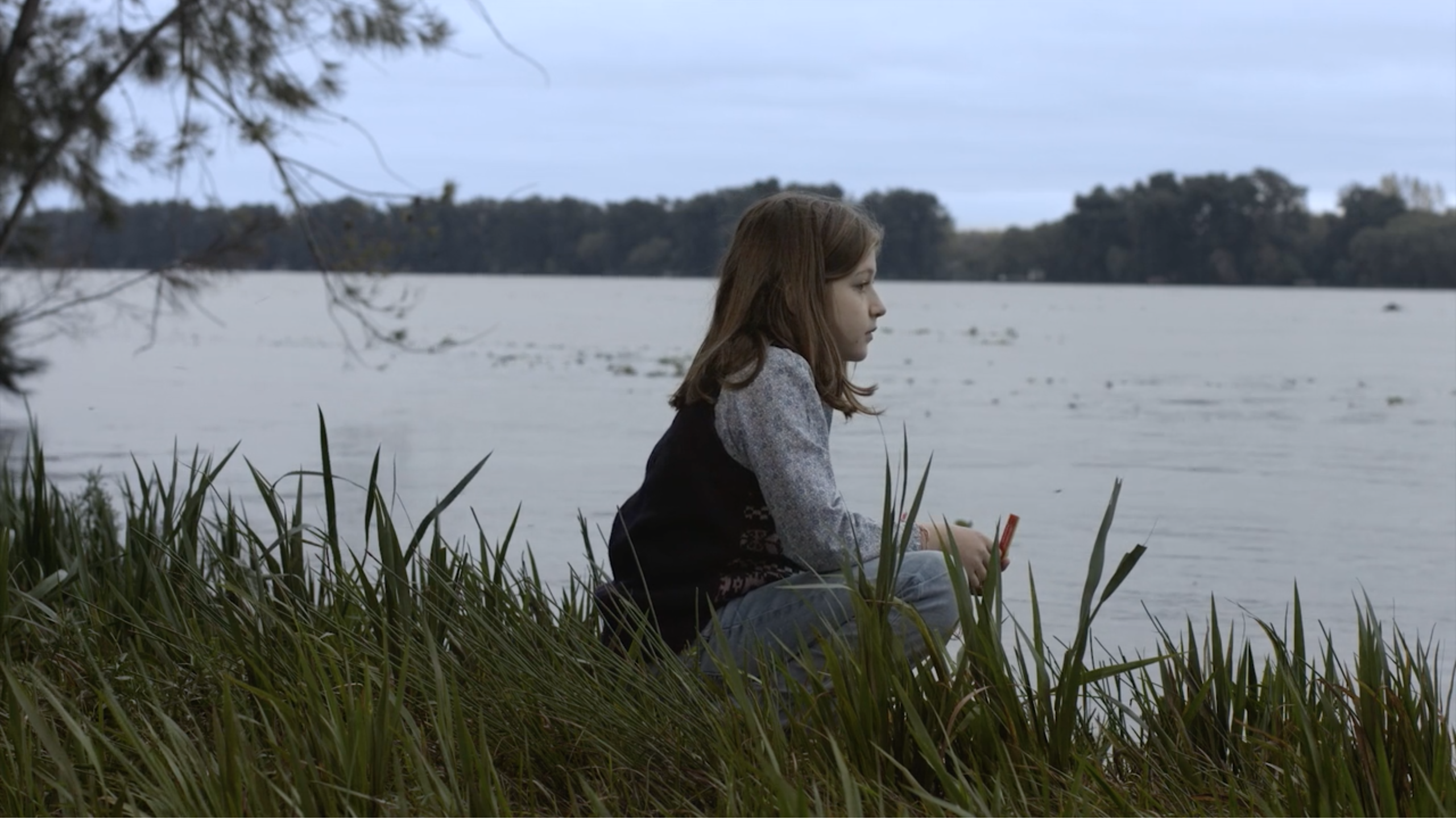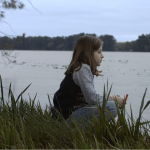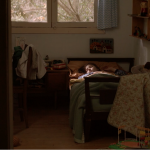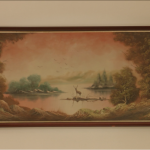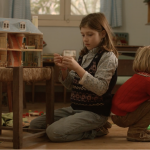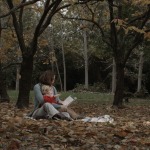Sunday
Dimanche
– Technical Info / Información Técnica:
(2018) / 00:11:09 / Black Magic / 25fps / 16:9 / Color / sound: stereo / Tigre, Argentina / Drama /
– Tagline:
The consolation might come in a dream.
El consuelo puede llegar en un sueño.
– Logline:
A girl wakes up startled from a dream and discovers a mysterious presence in a painting which foretells the absence of her mother, and then she wakes up again to spend one last Sunday together.
Una niña se despierta sobresaltada de un sueño y descubre una misteriosa presencia en un cuadro que presagia la ausencia de su mamá, y vuelve a despertar a un último día juntas.
– Short Synopsis / Sinopsis Corta:
Ana, a 10-year-old girl, wakes up startled, thinking she’s slept in. She looks for her mother, but instead finds something unsettling. Ana then wakes up to another dream, one in which she encounters her mother and is able to spend one last Sunday together, before awakening again in her absence.
Ana, una niña de 10 años, despierta sobresaltada creyendo que se ha quedado dormida. Busca a su mamá, pero descubre algo inquietante en su lugar. Ana despertará, entonces, a otro sueño, en el que se encuentra con su mamá para pasar un último domingo juntas, antes de volver a despertar a su ausencia.
– Synopsis / Sinopsis:
Ana is a 10-year-old girl who lives with her mother and sister in a house in the countryside. One morning she wakes up startled from a dream. She thinks she has slept in and is worried about being late to school. She runs through the house in search of her mother, whom she cannot find. A sound, which she thinks she’s heard before in a dream, draws her into her mother’s room, where a strange presence in a painting portends a change in her life. Ana wakes up again, this time she encounters her mother and they spend one last Sunday together.
Ana es una niña de 10 años que vive con su mamá y su hermana en una casa de campo. Una mañana se despierta sobresaltada de un sueño. Cree que se ha quedado dormida y teme llegar tarde al colegio. Recorre la casa buscando a su mamá sin hallarla. Un sonido, que cree haber escuchado antes, en un sueño, la conduce al cuarto de su madre, donde una extraña presencia en un cuadro presagia un cambio en su vida. Ana despierta nuevamente, esta vez encontrará a su mamá para pasar un último domingo juntas.
– Director´s Biography / Biografía del Director:
JAZMÍN FERREIRO
Jazmín Ferreiro holds a PhD in Philosophy by the University of Buenos Aires and studied Film in the IDAC between 2005 and 2009. She teaches Ancient and Medieval Philosophy in the University of Buenos Aires and the National University of General Sarmiento. Jazmín directed two short films: “La idiota” and “Perdida” (unreleased). “La idiota” was selected to participate in the Ibero-American Film Festival “Imaginando a Buñel” (2011) and in the Ibero-American Contest of Short Films carried out by women, a contest organized by “La mujer y el cine” [Woman and Film] (2011).
Jazmín Ferreiro es Doctora en Filosofía por la Universidad de Buenos Aires y estudió cine en el IDAC entre los años 2005 y 2009. Es docente de la Universidad de Buenos aires y de la Universidad Nacional de General Sarmiento donde dicta clases de Filosofía Antigua y Medieval. Dirigió dos cortometrajes: “La idiota”, seleccionado para participar en el Festival Iberoamericano de cortometrajes “Imaginando a Buñuel” (2011) y del Concurso Iberoamericano de cortometrajes realizados por mujeres organizado por La mujer y el cine (2011), y el inédito “Perdida”.
– Director’s Statement / Declaraciones del Director:
Derrida claims that the only possible way to mourn is to be unable to do so. When facing the loss of a loved one, the closure that the mourning is said to bring seems, indeed, impossible. In the story, we tell death is a haunting absence that comes, finally, into manifestation. When death interrupts, it modifies and makes uncertain what once seemed familiar and certain. There is, however, a way of living this absence, a little bit beyond the suffering of the loss, and sometimes it is a dream that we receive the consolation. In the dream, the linear character of time is suspended, and this suspension makes it possible for the past to be lived as the present. What we remember remains as living presently in our memory. I am particularly interested in the connection between mourning and memory. The story we share in “Domingo” combines memories and dreams. The costume and art hide little relics that belong to my childhood. In order to develop this topic, we made use of specific resources: the frontal shot, the fragmentation of the frame, the use of the middle third, and the repetition of sequences. The creation of the frame in the frame introduces the out of frame in the frame. The off in the frame represents the vacuum as presence: the paradoxical presence of someone who is no longer there. This way, the lateral thirds work as frameworks in the frame, they set a limit, but a preset limit, as opposed to the absent limit which is the margin of the frame. Our pursuit is reinforced by the particular way of portraying the mother, the great absence present in this story: we never see her face, hidden in the out of frame, or covered behind her hair. We wanted to work with a limited number of formal elements which are repeated, in the way of a ritual. Repetition introduces us to the logic of a suspended time, the time of memory and the time of mourning.
Afirma Derrida que el único duelo posible es el duelo imposible. Frente a la pérdida de un ser amado la clausura que supone el duelo parece, efectivamente, imposible. En la historia que presentamos la muerte es una ausencia que asecha hasta finalmente manifestarse. Cuando la muerte irrumpe, modifica y vuelve incierto lo que antes parecía familiar y seguro. Sin embargo, un poco más allá del dolor de la pérdida, es posible una forma de vivir la ausencia, y el consuelo llega a veces en un sueño. En el sueño la suspensión del carácter lineal del tiempo hace posible que lo pasado sea vivido como presente. Lo que se recuerda sigue existiendo como presente vivo en nuestra memoria. Me interesa la especial relación entre el duelo y el recuerdo. La historia que contamos en “Domingo” es una combinación de recuerdos y sueños. El vestuario y el arte están plagados de pequeñas reliquias de mi infancia. Para dar lugar a esta temática, se tuvieron en cuenta ciertos recursos específicos: los planos frontales, la fragmentación del cuadro, la utilización del tercio central, la repetición de secuencias. La creación del cuadro dentro del cuadro introduce el fuera de cuadro en el cuadro. En este sentido el off dentro de cuadro es la representación del vacío como presencia, de la paradójica presencia de aquel que ya no está. Los tercios laterales funcionan así como un marco dentro del cuadro, son un límite, pero un límite presente a diferencia del límite ausente del borde de cuadro. Refuerza esta búsqueda el modo elegido para retratar a la madre, la gran ausencia presente en esta historia: nunca veremos su rostro, oculto en el fuera de cuadro o escondido detrás de su cabello. Buscamos trabajar con elementos formales limitados que se repiten como en un ritual. La repetición nos introduce en la lógica de un tiempo detenido, el tiempo del recuerdo y el tiempo del duelo.
– Overview / Ficha técnica:
Script / Guión: Jazmín Ferreiro
Producer / Producción: Jazmín Ferreiro
Executive Productor / Productor Ejecutivo: Jazmín Ferreiro
Productor Assistant / Asistente de Producción: Andrea Testori, Alejandra Iannino
Director / Director: Jazmín Ferreiro
Assistant Director / Asistente de Dirección: Micaela Picco
Director of Photography / Dirección de Fotografía: Paula Moneta
Camera / Cámara: Pepe Peralta
2do Asistente de Cámara: Sebastián Cantillo
Film Editor / Edición: Lucia Feuillet
Art Director / Dirección de Arte: Sebastián Beretta
Animation / Animación: Florencia Giacomini
Sound design / Diseño de sonido: Virginia Tognola
Música / Music: Ángeles Rojas
Cast / Elenco: Ana: Ofelia Necchi; Tuqui: Francisca Necchi; Mamá: Mercedes Spangenberg
– Festivals, Awards and Nominations / Festivales, Premios y Nominaciones:
– Links:
Trailer English Subtitles: https://vimeo.com/246211120
Facebook: https://www.facebook.com/Domingo-133879640629060/
Instagram: www.instagram.com/domingo.cortometraje
– Contact / Contacto:
Gisela Chicolino
FilmsToFestivals
